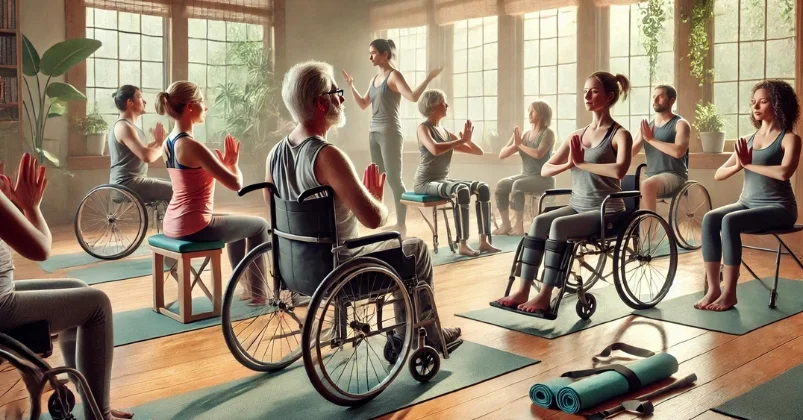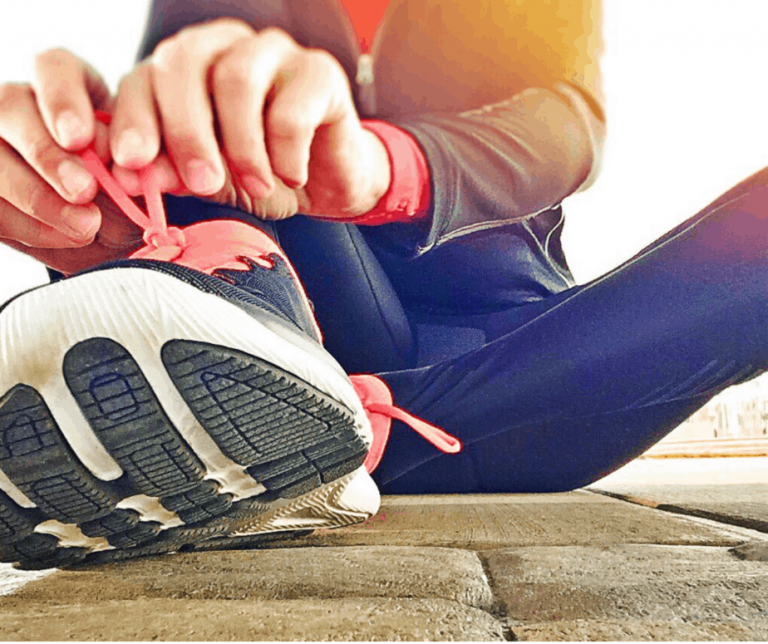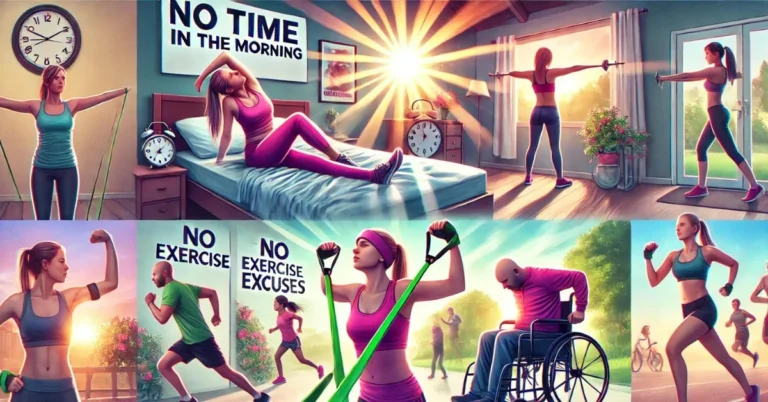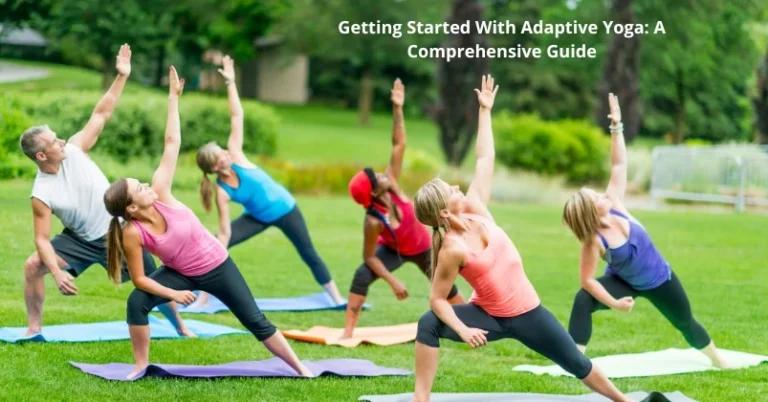Adaptive Yoga for Multiple Sclerosis: A Comprehensive Guide
Adaptive yoga is a form of yoga that can be modified to meet the needs of individuals with various physical abilities and disabilities. This type of yoga is designed to be accessible to everyone, regardless of their physical limitations. One group of individuals who can benefit greatly from adaptive yoga is those with multiple sclerosis (MS).
Multiple sclerosis is a chronic autoimmune disease that affects the central nervous system. Symptoms of MS can include fatigue, muscle weakness, balance issues, and difficulty with coordination and movement. Adaptive yoga can help individuals with MS manage their symptoms and improve their overall quality of life.
Key Takeaways
- Adaptive yoga is a form of yoga that can be modified to meet the needs of individuals with various physical abilities and disabilities.
- Individuals with multiple sclerosis can benefit greatly from adaptive yoga, as it can help manage symptoms and improve overall quality of life.
- Adaptive yoga can be practiced using props and tools, and online resources are available for those who may not have access to in-person classes.
Understanding Multiple Sclerosis
Multiple sclerosis (MS) is a chronic, unpredictable, and often disabling disease of the central nervous system (CNS) that affects over 2.3 million people worldwide. The National MS Society defines MS as a condition where the immune system attacks the myelin, a fatty substance that surrounds and protects nerve fibers in the CNS. This leads to inflammation and damage to the myelin, causing a range of symptoms that vary from person to person.
Symptoms of MS can include fatigue, numbness or tingling in the limbs, muscle weakness, difficulty with coordination and balance, vision problems, and cognitive impairment. These symptoms can be unpredictable and can come and go, or they can persist and worsen over time.
MS is a complex condition that can be difficult to diagnose, and there is currently no cure. However, there are treatments available that can help manage symptoms, slow the progression of the disease, and improve the quality of life for patients with MS.
One challenge that patients with MS face is the potential for exacerbation, which is a sudden worsening of symptoms. Exacerbations can be triggered by a variety of factors, including stress, infection, or changes in medication. Patients with MS need to work closely with their healthcare team to develop a plan for managing exacerbations.
Overall, MS and other neuromuscular conditions can have a significant impact on a person's daily life. However, with the right treatment and support, many people with MS can live full and active lives.
Adaptive yoga: An overview
Adaptive yoga is a type of yoga that is designed to be accessible to people with physical limitations or conditions that make traditional yoga poses difficult or impossible. One of the conditions that adaptive yoga can be particularly helpful for is multiple sclerosis (MS).
MS is a progressive neurological disease that affects the central nervous system and can cause a range of symptoms including spasticity, fatigue, depression, anxiety, bowel and bladder dysfunction, impaired mobility, and cognitive impairment. Adaptive yoga can be a useful tool for managing these symptoms and improving overall quality of life.
Adaptive yoga for MS typically involves modifications to traditional yoga poses, the use of props such as blocks, chairs, and blankets, and a focus on balance, breathing, and meditation. The goal of adaptive yoga is to create a safe and comfortable practice that meets the specific needs of each student.
There are many different types of adaptive yoga, but some of the most common include Hatha yoga, therapeutic yoga, and accessible yoga. These types of yoga can be practiced in a group setting or one-on-one with a trained instructor.
In adaptive yoga, the focus is not on achieving a perfect pose, but rather on finding a pose that works for the individual student. This may involve using props to modify traditional poses or creating entirely new poses that are better suited to the student's needs.
Overall, adaptive yoga can be a powerful tool for people with MS who are looking to manage their symptoms, improve their physical and mental health, and enjoy the many benefits of yoga.
Adaptive yoga for multiple sclerosis
Adaptive yoga is a style of yoga that is accessible to everybody, including those with multiple sclerosis (MS). MS is a neurological disease that affects the central nervous system, causing a wide range of symptoms such as fatigue, weakness, and difficulty with movement. Adaptive yoga is designed to be adaptable to the unique needs of each individual, making it an ideal practice for those with MS.
Participants in adaptive yoga classes for MS can experience a variety of benefits, including improved movement, relaxation, flexibility, physical strength, and alignment. Yoga is an excellent form of exercise for those with MS, as it can be done at any level of ability and can be adapted to accommodate physical limitations.
Adaptive yoga for MS can be practiced in a variety of settings, including virtual classes, chair yoga, standing and mat flow, and yoga with a chair and on the earth. These classes are typically designed for all levels, from beginners to advanced practitioners, and can be easily modified to suit individual needs.
For those who prefer to practice at home, there are many resources available for home practice, including online classes and yoga poses specifically designed for those with MS. Zoom classes are also available for those who prefer the convenience of practicing from home.
In summary, adaptive yoga for multiple sclerosis is an excellent way to improve health and well-being for those with MS. With its focus on movement, relaxation, and flexibility, yoga can help individuals with MS to improve physical strength, alignment, and overall quality of life.
Benefits of Adaptive Yoga for MS
Adaptive yoga is a modified form of yoga that is designed to make yoga accessible to people with different physical abilities. It is a safe and effective way for people with multiple sclerosis (MS) to improve their quality of life. Here are some of the benefits of adaptive yoga for MS:
Physical benefits
Adaptive yoga can help people with MS to improve their flexibility, strength, and balance. It can also help to reduce pain and stiffness in the hips and other joints. Studies have shown that adaptive yoga can improve walking speed and reduce fatigue in people with MS. It can also help to improve core temperature regulation, which is important for people with MS who may experience heat sensitivity.
Psychological benefits
Adaptive yoga can also have psychological benefits for people with MS. It can help to reduce stress and promote relaxation, which can improve overall health and well-being. It can also help to improve mood and reduce symptoms of depression and anxiety. Adaptive yoga can also provide a sense of community and interaction, which can be important for people with MS who may feel isolated or disconnected from others.
Mind-body awareness
Adaptive yoga can help people with MS to develop a greater awareness of their body and mind. It can help to improve alignment and posture, which can reduce the risk of falls and other injuries. It can also help to improve body awareness, which can be important for people with MS who may experience numbness or tingling in their limbs. Adaptive yoga can also help to improve the interaction between the nervous system and the musculoskeletal system, which can improve overall physical function.
In summary, adaptive yoga can have many benefits for people with MS. It can improve physical function, reduce symptoms, and promote relaxation and well-being. It is a safe and effective way for people with MS to improve their quality of life.
Adaptive yoga and other neuromuscular conditions
Adaptive yoga is a form of yoga that modifies traditional yoga postures to make them more accessible to people with physical disabilities, neuromuscular conditions, and other health concerns. This type of yoga can be particularly beneficial for individuals with multiple sclerosis, Parkinson's disease, stroke, and other neuromuscular conditions.
In adaptive yoga, postures are modified to accommodate the individual's abilities and limitations. This may involve the use of props, such as blocks, straps, and blankets, to support the body and make it easier to achieve the correct alignment. Additionally, the pace of the class may be slower to allow for more time to transition between postures and to ensure that the individual can maintain proper form.
For individuals with neuromuscular conditions, adaptive yoga can help improve balance, flexibility, and strength. It can also help reduce muscle stiffness and spasticity, which can be common symptoms of these conditions. Furthermore, adaptive yoga can help individuals with these conditions manage stress and anxiety, which can be beneficial for overall health and well-being.
One study published in Holistic Nursing Practice found that an 8-week online adaptive yoga program was effective in improving balance, flexibility, and quality of life in individuals with multiple sclerosis. Another study published in the Journal of Alternative and Complementary Medicine found that adaptive yoga was effective in reducing symptoms of Parkinson's disease, such as tremors and rigidity.
Overall, adaptive yoga can be a safe and effective form of exercise for individuals with neuromuscular conditions. However, it is important to work with a qualified adaptive yoga instructor who has experience working with individuals with these conditions to ensure that the practice is safe and appropriate for the individual's needs and abilities.
Adaptive yoga props and tools
Adaptive yoga is a style of yoga that is accessible to everyone, regardless of their physical abilities. Props and tools are an essential part of adaptive yoga, making it possible for individuals with multiple sclerosis to practice yoga safely and comfortably.
Blocks and chairs
Blocks and chairs are commonly used in adaptive yoga to provide support and stability during yoga poses. Blocks can be used to bring the floor closer to the body, making it easier to reach and maintain a pose. Chairs can be used for seated poses, to provide support for balance, or to make standing poses more accessible.
Wheelchairs
Wheelchairs can also be used as a prop in adaptive yoga. They provide support and stability during seated poses and can be used to modify standing poses. Wheelchairs can also be used to move between poses and to position the body for specific stretches.
Blankets and straps
Blankets and straps are used to provide additional support and comfort during yoga poses. Blankets can be used as padding for sensitive areas, such as the knees or hips, or to provide warmth during relaxation. Straps can be used to extend the reach and provide support during stretches.
Other props
Other props commonly used in adaptive yoga include bolsters, pillows, and yoga wedges. Bolsters can be used to support the back, hips, or legs during relaxation poses. Pillows can be used to support the head and neck during relaxation or to provide additional support during seated poses. Yoga wedges can be used to elevate the hips or support the hands during poses that require a lot of wrist flexibility.
Overall, the use of props and tools in adaptive yoga is essential to make the practice accessible and safe for individuals with multiple sclerosis. By using these props, individuals can modify poses to meet their specific needs and abilities, allowing them to practice yoga with confidence and ease.
Online adaptive yoga resources
For those with multiple sclerosis, online adaptive yoga resources can provide a convenient and accessible way to practice yoga from the comfort of their own home. These resources can take many forms, including virtual classes, YouTube videos, and Zoom sessions.
One popular resource is Yoga Moves MS, which provides adaptive online yoga classes specifically designed for those with multiple sclerosis, Parkinson's disease, stroke, and other neuromuscular conditions. The classes are led by experienced yoga instructors who have been trained in adaptive yoga techniques, and they are tailored to the unique needs of each participant.
Another option for online adaptive yoga is the National Multiple Sclerosis Society, which offers a variety of resources for those with MS, including information on yoga and other forms of exercise. Their website includes articles, videos, and other resources that can help individuals with MS learn more about yoga and how it can benefit them.
For those who prefer to practice yoga on their schedule, YouTube can be a great resource. There are many channels dedicated to adaptive yoga for MS, including Adaptive Yoga for Multiple Sclerosis, which offers a variety of videos that are specifically designed for those with MS. These videos can be accessed at any time and can provide a convenient way to practice yoga on your own time.
Finally, Zoom sessions can also be a great way to practice adaptive yoga online. Many yoga instructors now offer virtual classes via Zoom, which can provide a more interactive and personalized experience than pre-recorded videos. These classes can be accessed from anywhere with an internet connection, and they can be a great way to connect with other individuals who are also practicing adaptive yoga.
Overall, there are many online adaptive yoga resources available for those with multiple sclerosis. Whether you prefer virtual classes, YouTube videos, or Zoom sessions, there is likely an option that will work for you. By incorporating yoga into your routine, you can improve your physical and mental health and better manage the symptoms of MS.
Consulting healthcare providers
Before starting any exercise program, it is important to consult with your healthcare provider. This is especially true for individuals with multiple sclerosis (MS) who may have specific needs and limitations. Your healthcare provider can help you determine if adaptive yoga is safe and appropriate for you.
During your consultation, be sure to discuss any concerns or questions you may have about starting an adaptive yoga program. It is important to inform your healthcare provider about any MS symptoms you may be experiencing, such as bladder dysfunction or spasticity, as these may affect your ability to participate in certain poses or exercises.
Your healthcare provider may also want to monitor your blood pressure during your adaptive yoga classes, as some poses may cause a temporary increase in blood pressure. It is important to follow your healthcare provider's recommendations and guidelines to ensure your safety and well-being.
If you are interested in participating in adaptive yoga classes, your healthcare provider may be able to recommend specific programs or instructors who are trained in working with individuals with MS. It is important to find an adaptive yoga program that is tailored to your specific needs and abilities.
In summary, consulting with your healthcare provider before starting an adaptive yoga program is essential for individuals with MS. Your healthcare provider can help determine if adaptive yoga is safe and appropriate for you, monitor your blood pressure, and recommend specific programs or instructors. By working with your healthcare provider, you can ensure a safe and effective adaptive yoga experience.
FAQs
Adaptive yoga poses can help people with multiple sclerosis improve their strength, balance, flexibility, and overall well-being. Some poses that may be helpful include the mountain pose, tree pose, warrior II pose, triangle pose, and the seated spinal twist. It's important to work with a trained instructor who can help modify poses to meet individual needs.
Certain yoga poses may not be suitable for people with multiple sclerosis, depending on their symptoms and level of mobility. Poses that involve deep backbends, headstands, or inversions may be challenging or uncomfortable for some individuals. It's important to work with a trained instructor who can help modify poses or suggest alternative poses if needed.
Occupational therapists can receive adaptive yoga training through specialized courses and workshops. The International Association of Yoga Therapists (IAYT) offers a certification program for yoga therapists, which includes training in adaptive yoga. Additionally, many yoga studios and organizations offer specialized training for healthcare professionals who want to incorporate yoga into their practice.
Practicing adaptive yoga can have many benefits for people with multiple sclerosis, including improved strength, balance, flexibility, and range of motion. Yoga can also help reduce stress, anxiety, and depression, and improve overall quality of life. Additionally, yoga can be a safe and effective way to manage symptoms such as pain, fatigue, and spasticity.
Many conferences and retreats focus on multiple sclerosis and adaptive yoga. The National Multiple Sclerosis Society and the Multiple Sclerosis Association of America both offer educational programs and events for people with MS and their families, including yoga and wellness retreats. Additionally, many yoga studios and organizations offer specialized retreats and workshops for people with MS.
Chair yoga can be a safe and effective option for people with multiple sclerosis who may have limited mobility or difficulty with balance. Chair yoga involves modified yoga poses that can be done while seated in a chair, making it accessible for people with a range of abilities. It's important to work with a trained instructor who can help modify poses or suggest alternative poses if needed.








